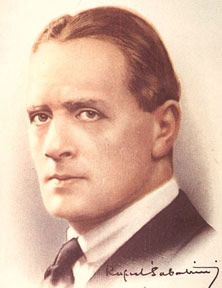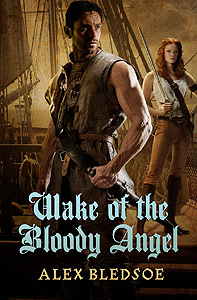The Man Who Gave Us Pirates
Published on August 29th, 2012 in: Books, Movies |By Alex Bledsoe
Alex Bledsoe is guest blogging today on Popshifter. Our Q&A with him appeared in our 2010 Halloween Horrors issue, Season of the Witch.

Rafael Sabatini
My fourth Eddie LaCrosse novel, Wake of the Bloody Angel is about pirates. Yes, those filthy, illiterate, ruthless criminals of the sea who tortured, raped, murdered, and pillaged their way into history in a surprisingly short period of time (roughly 1690-1730). And after reading about some of their deeds, I was struck by this question: why the hell do we admire these people? Why do we look up to them as heroes, write books and make movies about them, give them sexy faces like Errol Flynn, Tyrone Power, and Johnny Depp?
And then I realized it’s mostly because of Rafael Sabatini.
Sabatini, a novelist who died in 1950, wrote Captain Blood. He wrote The Sea Hawk. He wrote The Black Swan. That’s three classic pirate novels that became three classic pirate movies. He did more to turn the pirate into a pop-culture archetype than anyone, with the possible exception of Robert Louis Stevenson. And in doing so, he also created a fake mythology that’s turned out to be more potent than actual pirate reality.
In Captain Blood, the hero is an Irish doctor, condemned and sold into slavery. In The Sea Hawk (the book, not the movie), the hero is an English noble sold into slavery by an evil brother. In The Black Swan (again the book, not the movie), the hero is a French gentleman who turns out to have been a former pirate (the movies played fast and loose with the plots of the last two novels, but certainly captured their spirits).
Now consider that history’s most famous pirate, Blackbeard, began life as a common seaman. Black Sam Bellamy, the inspiration for a major character in Wake of the Bloody Angel, was also a common seaman before turning pirate. Captain Kidd was a Scottish commoner. Benjamin Hornigold, who trained both Blackbeard and Black Sam, was a commoner.
In other words, Sabatini imposed the idea of the noble (in both senses of the word) pirate onto a bunch of men who’d risen by sheer force of will from the lowest rung of their societies. He taught us that pirates were merely good men wronged, who fought for king/queen and country behind a mere mask of villainy. And we’ve been sailing with those guys, instead of the real pirates, ever since, up to and including the essentially harmless Captain Jack Sparrow.
Not that pirates had no admirable qualities. Their crews were integrated, both racially and sexually, in ways that we still haven’t quite matched in modern society. Captains ruled only by the democratic choice of the crew, and could be deposed at any time (a response to the ironclad naval discipline most pirates had experienced as seamen). They often exercised restraint and mercy, as long as their prey didn’t fight back or make a fuss. And when they had money, they spent it freely; the idea that pirates routinely buried their treasure is a myth.
But the fact remains that these were ruthless killers, criminals of the worst sort who more often than not left death and destruction in their wake.
And yet, thanks to Raphael Sabatini, we admire them.

When I starting doing research for Wake of the Bloody Angel, I accepted the Sabatini view. I loved Errol Flynn, Tyrone Power, and yes, Johnny Depp. But the more I learned, the more I realized how false these images were. And that gave me a terrific dichotomy to work with: image vs. reality. If I did it right, I could embrace the swashbuckling that made me want to write about pirates in the first place, and still include some of the grim, less savory details. It helped that my pirates existed in my own fantasy world, so I was not constrained by historical reality. I could pick and choose from both sources.
So that’s what I hope you get in Wake of the Bloody Angel: a genuinely fun, swashbuckling high fantasy/mystery flavored with real-life details you might not have heard about before. I took Sabatini out behind the tavern, roughed him up a little, then brought him back inside and gave him plenty of rum.
Why didn’t I leave him there, in the mud and muck of real piracy?

Because without him, I would never have written about pirates in the first place.
Alex Bledsoe’s Wake of the Bloody Angel was published on July 3. You can order it from Amazon here. For more on Alex, please check out his website.
Time limit is exhausted. Please reload the CAPTCHA.